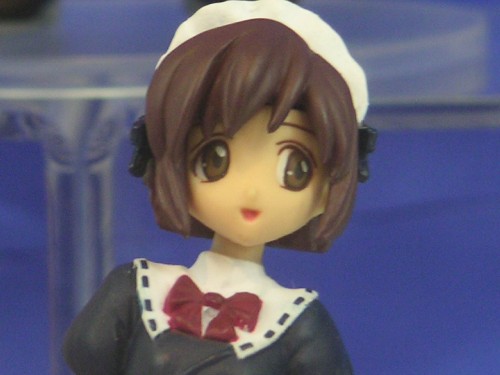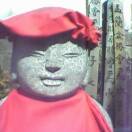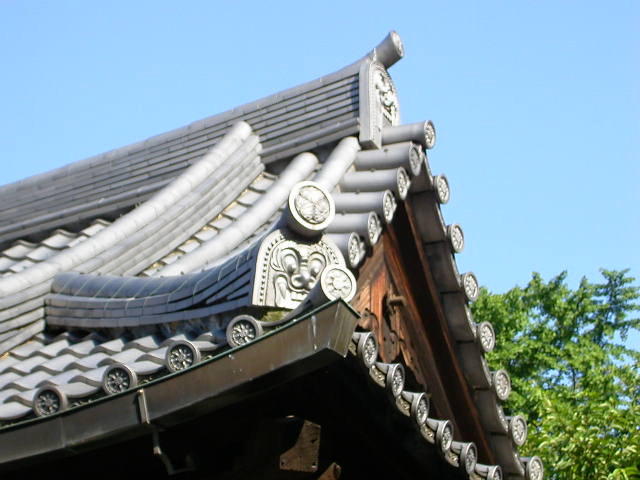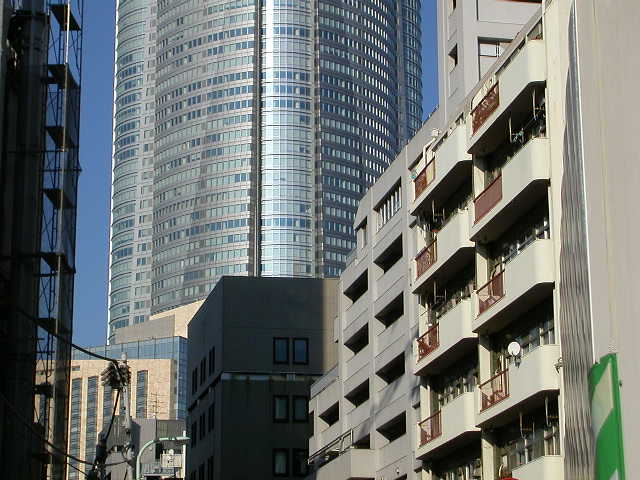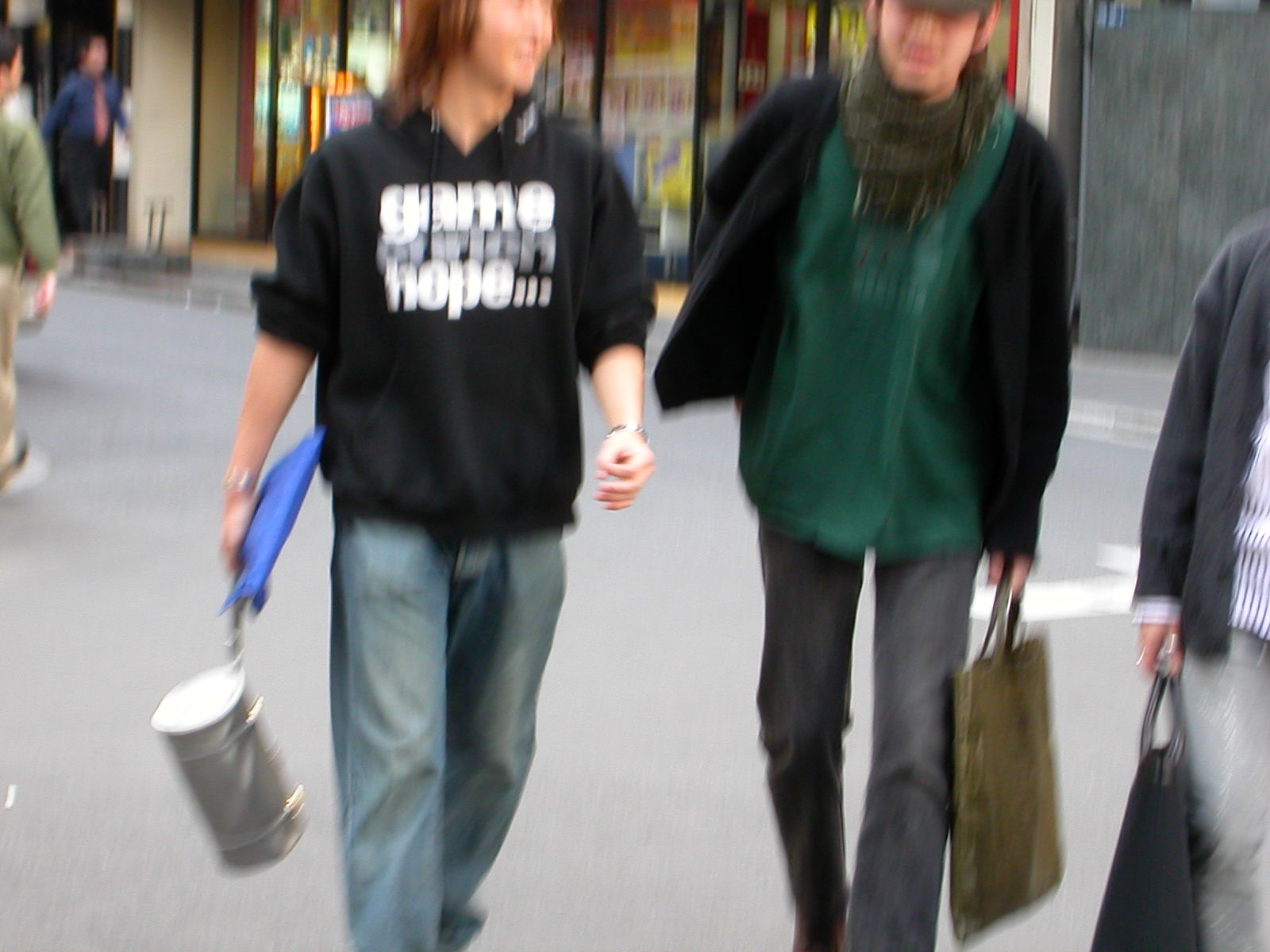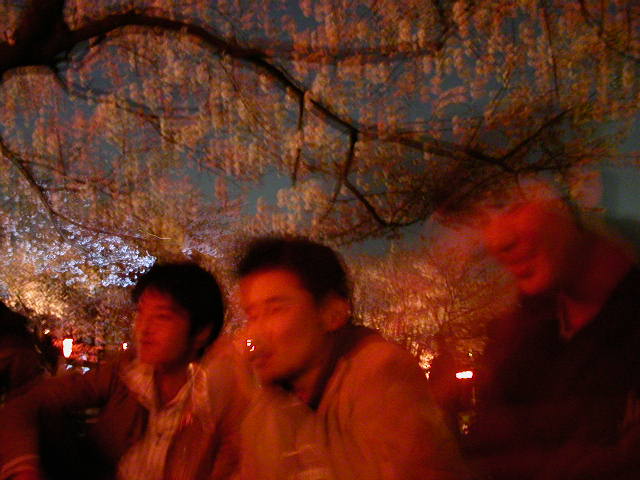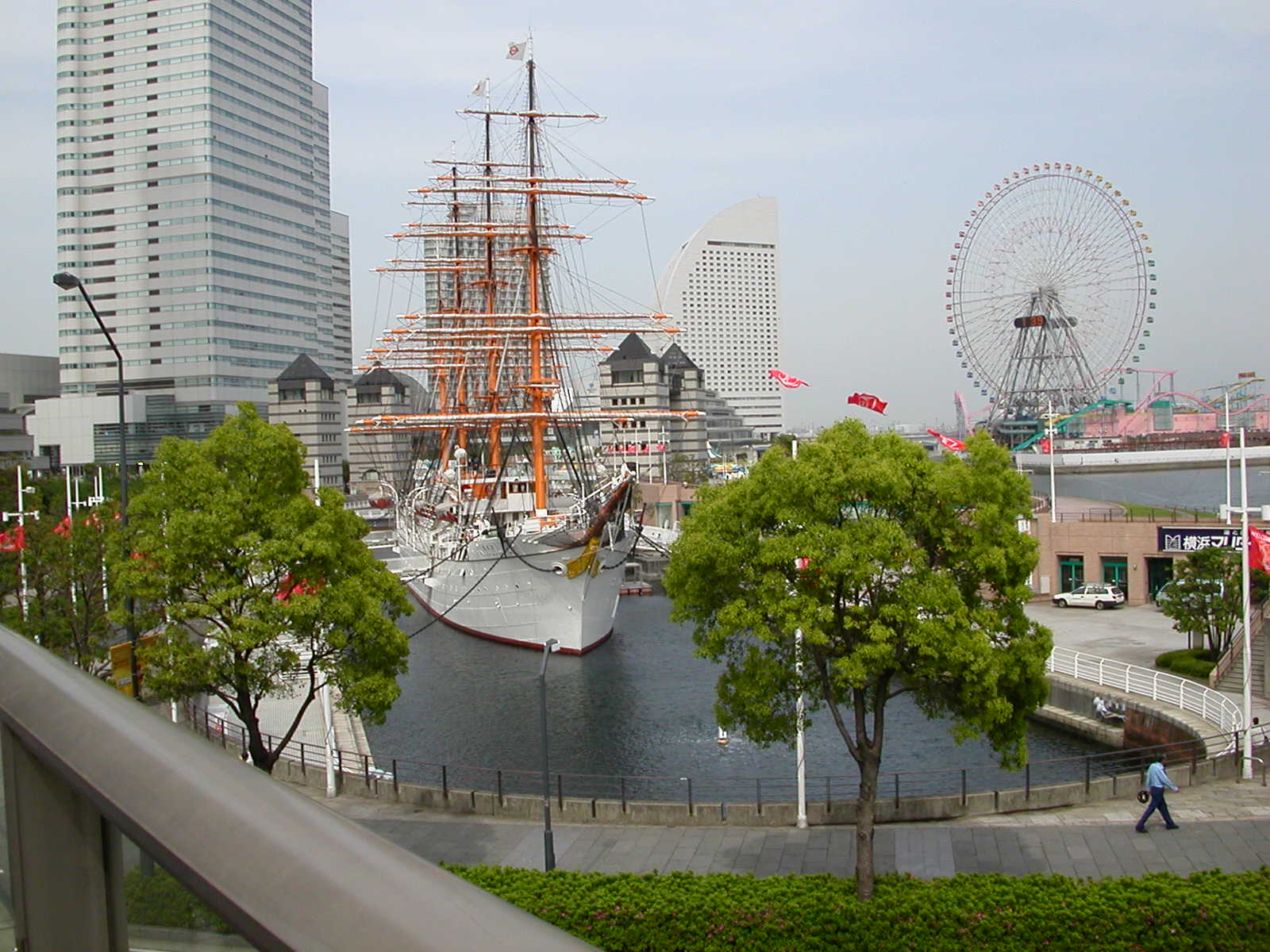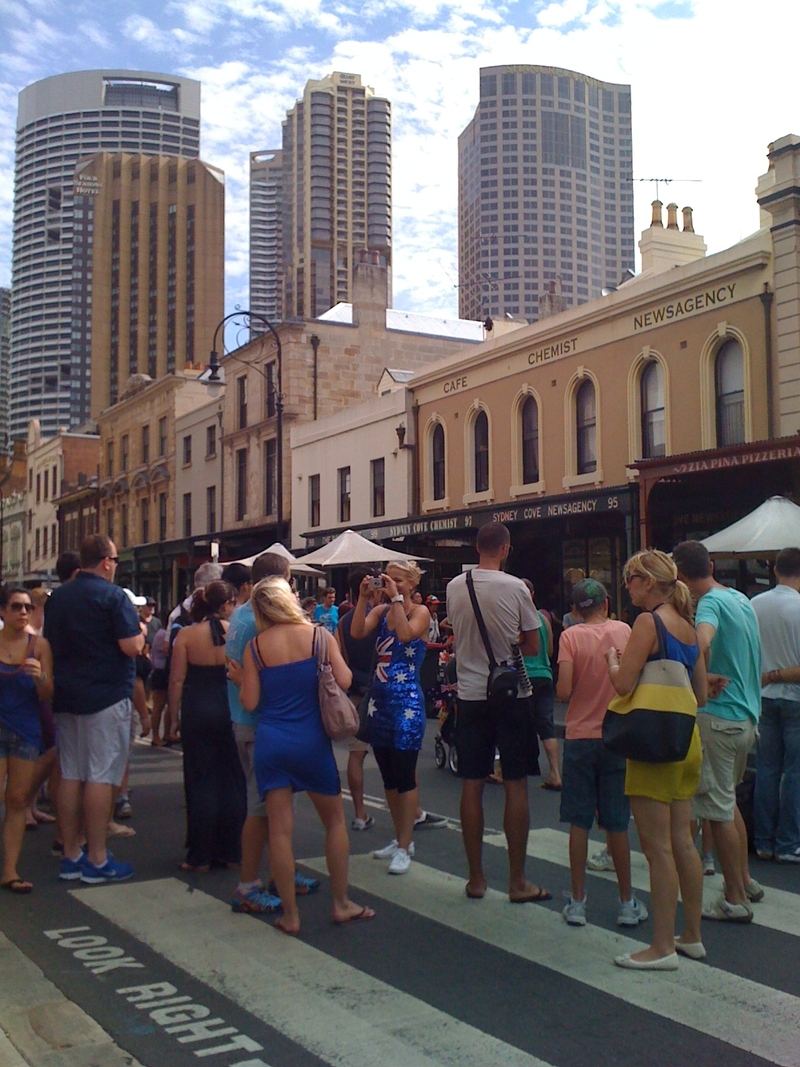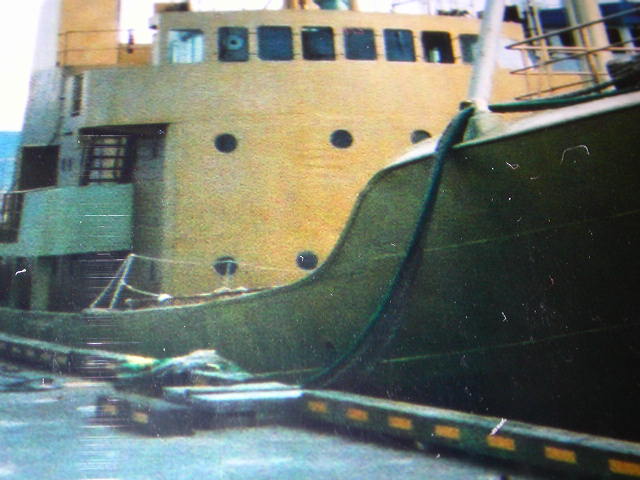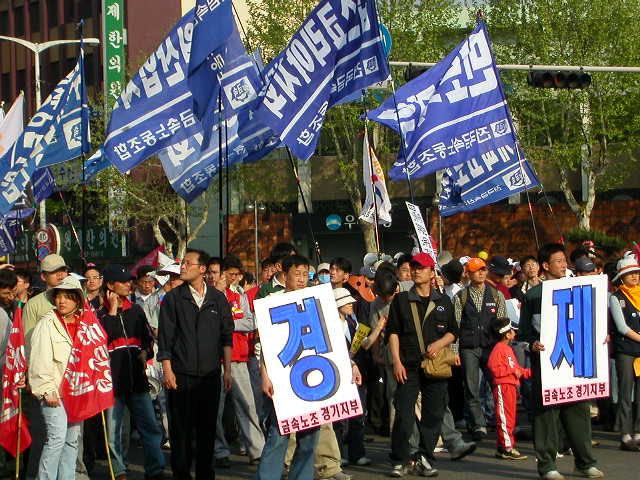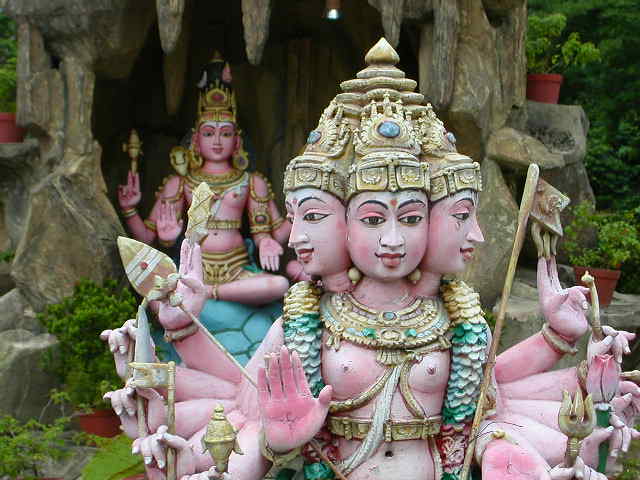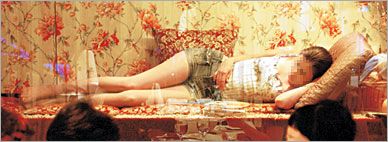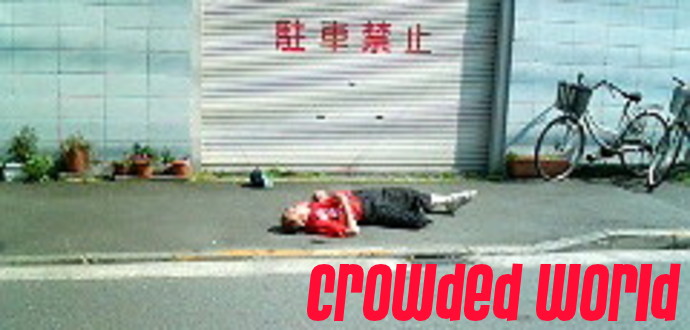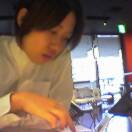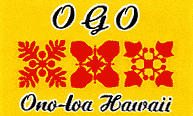| |||||||||||||||||
Foreigners staying here might be surprised to learn that this is a slum, one of the three slums in Japan (the other ones being in Osaka and somewhere else, I can't quite remember where -- perhaps it is the Kotobuki-cho district of Yokohama.) On the other hand, Manga and anime fanatics would definitely be interested to know that these gritty streets, lined by gnarled ginkgo trees, patrolled by squad cars, formed the backdrop for Ashita no Joe ("Tomorrow's Joe" or "Rocky Joe"), a boxing classic created by Tetsuya Chiba and Asao Takamori in 1968. Then as now, the area around Meiji Dori (Meiji Highway) was packed with basic hotels offering cheap lodgings to day laborers. Back in Ashita Joe's time, accommodation could be had for as little as 120 yen per night. Things are not quite as cheap these days, but cheap nonetheless -- for about 2000 yen a night you can get a room.
That relentless campaigner for gaijin and human rights in Japan Arudou Debito visited the place and commented: "San'ya (kanji: mountain valley) is a place of neither mountains nor valleys. In fact, its most famous landmark, the Bridge of Tears (Namidabashi) doesn't even have a bridge. According to my guide, it was a place where in old Edo families saw off their relatives facing capital punishment, hence the name. It's a place where people have never wanted to end up, bordering on the Yoshiwara Pleasure Quarters (a place with a long history and full of soaplands today) where people didn't stay. Given that it's not convenient to public transport, you won't necessarily find it. Rather, it's a place which finds you, depending on your economic situation. Even today, 'San'ya' is not listed on a map. It's long since been subsumed by more famous names on the map (Asakusa, Minami-Senjuu). And unless you have a reason to come here at all (cheap hotels during the World Cup 2002, day laboring), you could possibly spend your life in Tokyo and never know the place existed...
"San'ya, however, is an odd slum. It's not a blue-tarp tent city or a phalanx of corrugated-metal shacks sucking on Smoky Mountain, like you'd see in other countries. It's clean, cheap (a tourist draw, actually -- it has excellent maps in English and Japanese telling you what's there to see and eat and stay cheaply; the map even unabashedly calls the area Sanya -- as do Internet maps (http://www.maplandia.com/japan/kanto/tokyo/san-ya/)). The inhabitants taking shelter under the covered main storefront area seemed to be quite friendly (especially later at night after they have a snootful) and often returned our konbanwas. We stayed in a day laborer hotel (which even had its own website!) offering a clean 4.5 tatami room with TV (free p*rn), common bath and toilet, Internet in the lobby for 2700 yen a night. And saw overseas backpackers checking in at hotels elsewhere. San'ya is certainly a lot better than Japan's worst slum (that honor would probably belong to Osaka's Kamagasaki -- where people are reputedly very vocal against gawkers and ostentatious bearers of normal wealth). But my sample is biased; we were there on a good night -- warm summer, no rain, and people able to sleep rough in the parks. It's not a place you'd want to end up, to be sure -- especially in winter. Tom and Charles have experienced life on the streets with these people, and a nice chat with one crowd (a very friendly guy in his sixties who had been living this life for close to 30 years) revealed that they would be clearing out of their sleeping area by 3AM to be first in line for the next day's construction labor somewhere in Tokyo. Lose the romanticism about hoboes toasting marshmallows, people."
EATING: There is a Mac and a ramen shop near Minowa station. If you are game you can always dine with the homeless folk who can be found all over the place...
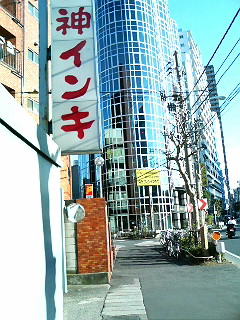


BaKpAK Tokyo Hostel: .
(3-12-5 Ryusen | Taito Ward, Tokyo.)
Phone: (03) 3875 3264. Web: www.tokyo.hostel.com/.
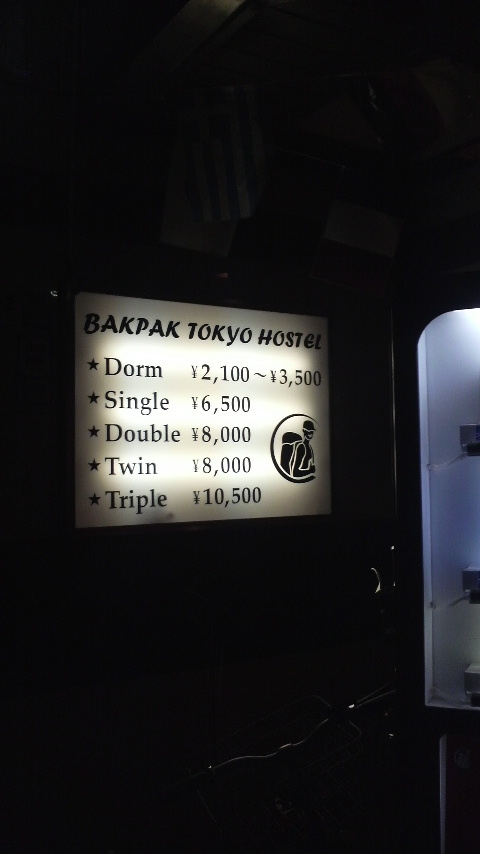
Part of the global chain, and apparently popular with the backpacking crowd. As you can see from the picture above, the prices are cheap here. For a TripAdvisor review, click here.
Business Hotel Fukudaya: 台東区川1-35-11P|RT|PP.
(1-35-11 Kiyokawa, Taito Ward, Tokyo.)
Phone & Fax: 03-3872-1091. Web: www.tctv.ne.jp/fukudaya/fukudaya.html.
Prices start at 3100 Yen per night.
Business Hotel Rakuyo: 台東区東Q|PW|PO.
(2-18-10 Higashi Asakusa, Taito Ward, Tokyo.)
Tel & Fax : 03-3876-7747. Web: www.tctv.ne.jp/fukudaya/rakuyo.html.
The price starts at 2500 yen per night for singles.
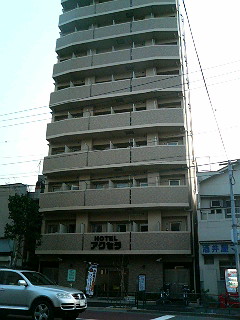 Hotel Accela: 台東区2-39-3ìQ|RX|R
.
Hotel Accela: 台東区2-39-3ìQ|RX|R
.
(2-39-3 Kiyokawa, Taito Ward, Tokyo.)
Next to the neighborhood koban (police box), and not far from a supermarket which is always busy and bustling with one particular kind of customer -- poor old men. This place is called ±¸ZÎÃÙ in Japanese, Hotel Accela in English. Brand new hotel, very beige and clean looking, but I am far from convinced that foreigners are allowed to stay there (you could always push your rights and demand to stay to be let in, of course, for Japan is a signatory to international conventions against racism.) Costs 3150 Yen a night... 79 800 Yen a month. Facilities include coin shower and coin laundry, erAbrúAC^[lbgÚ±(LAN`®) Aâ ÉAhC[(Ýo) AÂÊó²AwX[^[AJ~\A^IAoX^IAßAXbp . Check in from 6am to 26am.
Hotel Aporo: 台東区日本{çP|Q|X.
(1-2-9 Nihonzutsumi, Taitou-ku, Tokyo.)
Phone & Fax: 03-3875-0795
From 2500 Yen per night.
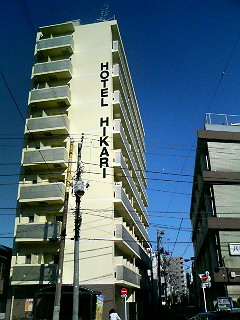 Hotel Hikari: 台東区æ´ìQ|RX|R
.
Hotel Hikari: 台東区æ´ìQ|RX|R
.
(2-39-3 Kiyokawa, Taito Ward, Tokyo.)
Phone: 03-3874-8651. Web: www.hotel-hikari.com.
This newly opened business hotel near Minowa, in the heart of northern Tokyo's backpacker district, has rooms for about 3000 Yen per night. As well as being in the heart of Tokyo's backpacker district, this is also the center of homeless Japan -- you will find plenty of old guys sleeping on the streets and pavements around this hotel. Facilities at Hotel Hikari include communal bathrooms (what better way to meet your fellow holidaymakers, than by getting buck naked in the baths!), coin laundry, kitchen and Lü wireless Internet. Some of the rooms are set up in the traditional Japanese style, with tatami mats. Although it has to be said, from the outside, this hotel looks anything but traditional Japanese -- it has more of a Hong Kong highrise vibe. But such is life in the big city.
Hotel Juyoh: 台東区æ´ìQ|川.
Hotel New Azuma: 台東区æ´ìQ|RW|R.
For a more thorough review of the New Koyo Hotel, click here.
New Hotel Tanaka: 台東区日本ú{çQ[QV|P.
Some other places in Nihonzutsumi and the greater Quartier Taito-ku (Ce quartier contient plusieurs hôtels parmi les moins chers de Tokyo.
Voir les liens!
(2-15-3 Kiyokawa, Taito Ward, Tokyo.)
Phone: 03-3875-5362. Web: http://www.juyoh.co.jp.
The hotel's homepage provides information in six languages, and the rooms are pretty cheap too -- expect to pay 3200 Yen for a single room, 6400 Yen for a double. Judging by the homepage, there seems to be a vibrant social scene going on at the hotel, which boasts traditional style rooms with tatami mats and futons on the floor. 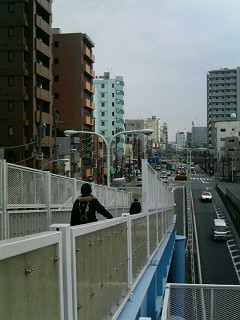 Hotel Neo: 台東区säæ´ìQ|RX|R
.
Hotel Neo: 台東区säæ´ìQ|RX|R
.
(2-39-3 Kiyokawa, Taito Ward, Tokyo.)
Phone: 03-3874-8651. Web: http://www.hotel-hikari.com.
In this photo you can see Hotel Neo (pale blue) with the aforementioned Hotel Hikari all canary yellow in the background, beyond the intersecting Meiji Highway. This really is the slummy side of town. Whoever thought the area would take off as a backpacker center... then again, no Japanese would choose to live here (apart from the homeless dudes that is.) And plenty of homeless dudes there are too... sprawled out under blankets on the side of the roads, slurping instant noodles and chugging down cooking sake and laughing with their friends. This is not a comfortable place but there many hotels costing around 3000 Yen per night. Hotel Neo is one of them.
(2-38-3 Kiyokawa, Taito Ward, Tokyo.)
Phone: 03-6802-0716. Fax: 03-6802-0715. Web: www9.ocn.ne.jp/~h-azuma/uk.
Single prices range from 2900 Yen to 3100 Yen. The hotel's official website states: "Traditional Japanese room with tatami mats, futon bedding
and Air condition,T.V.
"(All single rooms are for one person).
"tatami mats size (1 jou W83cm X D143cm) X 3 jou
room size W165 X D256."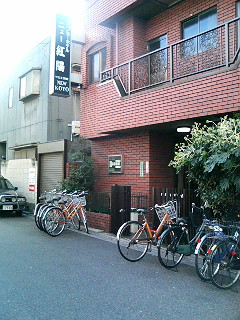 Hotel New Koyo: 台東区日本ú{çQ|QU|PR.
Hotel New Koyo: 台東区日本ú{çQ|QU|PR.
(2-26-13 Nihonzutsumi, Taito Ward, Tokyo.)
Phone: 03-3873-0343. Web: http://www.newkoyo.com.
This place has been billed as the cheapest hotel in Tokyo for travellers by the Japan Lonely Planet guide, and has also been glancingly referenced by the New York Times. Yes, it is true (as the New York Times wrote) that you can get a single room for $21 per night at the Hotel New Koyo. On the flip side, though, this is Nihonzutsumi, the former district of Sanya. Sanya had such an infamous reputation in the past they had to change the name to Nihonzutsumi -- the name has changed but the infamy lives on. So be reminded, this ain't Shibuya or Harajuku -- this is the rough end of town. There is a series of malls near here where there are more homeless men (construction workers laid off after the Bubble burst) than there are shopkeepers. Curiously (and perhaps emphatically), the mall management plays appropriately sad jazz elevator music, melancholy sax right around the clock, maybe to soothe the wounds of these pitiful down-and-outers. Anyway, the New Koyo is pretty cool nonetheless -- my buddy Preston Grassman stayed there a couple of years ago, I visited him there and it seemed slick inside, in contrast to the quiet desperation of the streets outside.
Rooms & Prices
Small single
Japanese style room(9)2.500 Yen
Medium single
Japanese room (33)
Western style room (22)2.700 Yen
Semi-Double
Japanese room (11)
Western style room (1)4.800 Yen
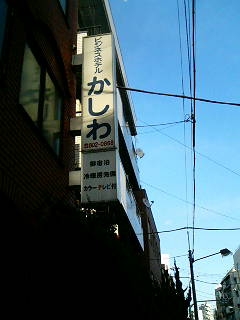 Kashiwa Business Hotel: .
Kashiwa Business Hotel: .
This sign used to be a landmark for me, while I navigated my way to teach Riki and his mother in Minowa. Riki used to keep an amazing array of (admittedly small) pets, such as kabuto mushi (stag beetles), tiny turtles.
(2-27-1 Nihonzutsumi, Taito Ward, Tokyo.)
Phone: 03-3875 1920.

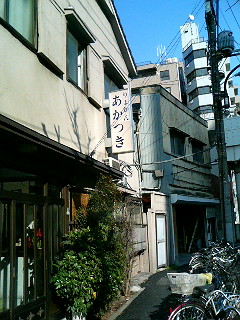 Ryokan Akatsuki: øÔså¼ûVRPQ|S.
Ryokan Akatsuki: øÔså¼ûVRPQ|S.
On the old and historic Meiji Dori near the Namidabashi Crossing (£´ð·_) can be found this rather old and traditionally Japanese ryokan (inn). As the Japanese writer above wrote, this the cheapest hotel he found walking around the area -- it costs just 900 Yen a night to stay at the Ryokan Akatsuki. That must make it one of the cheapest hotels in Tokyo, although it doesn't come close to the bargains which could be had in the µ½ÌW[ jidai, when lodging only cost you 120 yen a night! I don't expect the facilities there to be too modern but that is not the point. 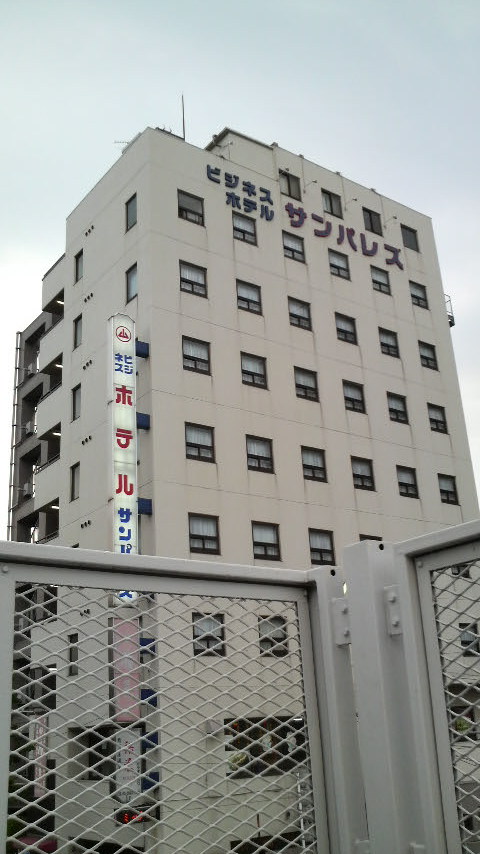 Sun Palace: 台東区srìæìçZQ-RQ-R.
Sun Palace: 台東区srìæìçZQ-RQ-R.
(2-32-3 Minami Senju, Arakawa Ward, Tokyo.)
Phone: 03-3807-5111. Web: http://www.sunpalace.jp.
Right beside Minami Senju station is this large business hotel, the TpX, which means "Sun Palace" in English. Doubtless few foreigners stay in the place, but if you ever want to pretend to be a lonely travelling salaryman for a day, this hotel could be for you. Biztrip says: "ÀÄÀSµÄÜêÜ·BìûwO๴ðnÁÄ·®Å·BSº³üLAN®õÅ·B" Which basically means that this hotel is cheap and offers peace of mind (the words "peace" and "cheap" sharing the same Chinese character, À, in the Japanese language); to get there take the pedestrian walkway, which is a concrete and steel work of art, from the south exit (ìû) from Minami Senju station. All rooms are wireless; it is local area network throughout."
Prices range from 5250 Yen for a single to 8190 Yen for a twin room. Amenities include restaurant, izakaya, and coin laundry.
Economy Hotel Hoteiya: 台東区日本
1-23-9 Nihonzutsumi, Taitou-ku
Tel & Fax : 03-3875-5912
Prix (single) : 2'600-2'800
(double) : 3'600-3'700
Page web : www.spocom.net/pc/hoteiya_e.shtml.
Economy Inn Ebisuya: 台東区日本
1-24-2 Nihonzutsumi, Taitou-ku
Tel & Fax : 03-3875-5912
Prix (single in dormitory) : 1'500
Page web : www.spocom.net/pc/ebisuya_e.shtml.
Business Hotel Kagaya: 台東区日本
1-2-1 Nihonzutsumi, Taitou-ku
Tel & Fax : 03-3875-1833
Page web : www.nepo.gr.jp/kagaya.
shibuya shopping | tokyo hotels
|
||||||
